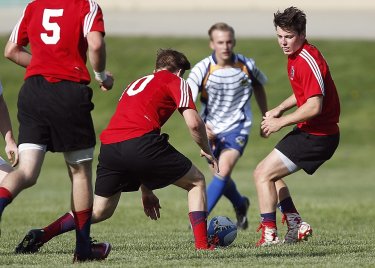Coaches strive to understand their athletes. They aim to understand how they learn and how they think in order to motivate and mold them into the athletes they want them to become. While coaches often act with the athlete’s best interest in mind by training and conditioning them physically for competition, coaches often miss crucial pieces of an athlete’s psychological experience. The psychological needs of an athlete can stem from performance situations, such as motivation or difficulty focusing during competition, or clinical situations, such as anxiety or depression.

Understanding and talking about the athlete’s psychological needs might help coaches understand what truly motivates each athlete and how they can better overcome the non-physical challenges they face throughout a season. No matter the number of hours spent training and conditioning, pre-competition anxiety can overwhelm even the most talented athlete. An athlete can diligently practice a new play, but the presence of an opponent or the pressure of the game may alter their ability to execute what they have practiced. Pressure situations can crack even the most prepared athletes who struggle with performance anxiety. By implementing psychological training components (i.e. sport psychology) coaches can assist athletes and teams in their quest to get better.
Why Sport Psychology Works
Sport psychology is the connection between the mind and the body and how the mind and body impact performance. Think of a race car. No matter how fast or powerful the car is, if the driver does not have the knowledge and control to operate the vehicle, the specifically built race car is no better than any other vehicle. Through the use of sport psychology concepts, the coach can aim to train athletes’ minds to effectively run their “race car,” through pressure and regular performances. Sport psychology concepts include topics like goal setting and self-talk to more complex theories of imagery and relaxation. Using these different sport psychology concepts, coaches can help athletes gain awareness of how their mind and body react during practice and competition, to better optimize performance. Having this awareness allows athletes and coaches to practice overcoming the innate internal obstacles that arise while they aim to achieve peak performance.

Key Sport Psychology Concepts for Coaches
Communication
Sport psychology can seem intimidating to many coaches. However, many basic sport psychology concepts can be addressed by coaches to improve the athlete’s mind and body connection. As coaches aim to understand their athletes, a constructive coach-athlete relationship is being built through trust and communication. Open communication and feedback are critical to a positive relationship. When communicating with athletes and providing them feedback, coaches should use constructive and positive feedback. Feedback framed as more positive and less aggressive is received better by most athletes. A coach getting angry and yelling, “Don’t leave your feet,” is less effective than explaining to the athlete how to stay grounded while defending. The explanation gives the athlete an opportunity to ask questions and learn new tactics, rather than learning how to not do something. Creating an environment that encourages open communication in the coach-athlete relationship allows coaches to understand their athletes and the difficulties they are having. This awareness can lead to support and assistance when overcoming obstacles throughout the season.
Goal setting
Coaches can continue open communication by clearly articulating the goals and expectations for the team. Goals can be set in team and individual settings by using the SMART (Specific, Measurable, Achievable, Relevant, and Timely) principle. Based on the team’s ability, coaches can identify 5-10 goals for the season and discuss progress metrics with the team throughout the season. The goals identified by the coach should be revisited and reexamined throughout the season and off-season. These milestones provide both coaches and athletes with a standard to evaluate their experience and the effectiveness of training/coaching programs.
 Self-talk
Self-talk
The relationship between the athlete and their thoughts is also a critical component where coaches can intervene in basic sport psychology concepts. Athletes’ self-talk (or internal dialogue with themselves throughout competitions and practice) impacts their performance. Coaches can help athletes monitor their self-talk by asking them about their thoughts during specific situations or events. Athletes must first identify their self-talk to alter negative, or unhelpful self-talk. Unhelpful self-talk can include thinking “I will never figure out how to run that route” or “I’m not good enough to make that play.” Once a coach helps an athlete identify their self-talk, they can work together to frame negative self-talk into more productive or instructional self-talk. Productive self-talk may remind the athlete, “I got this.” While instructional self-talk will direct an athlete how to complete the movement next time. Instructional self-talk is not the same for each athlete, in gymnastics, an athlete might think “Toes pointed and right arm straight” to remind themselves how to complete a specific movement.
Relaxation
Athletes experience physical and emotional stress during practice and throughout the season. Taking time to relax and assess the body and the body’s muscles helps athletes gain self-awareness and can reduce performance anxiety. Relaxation can be achieved through ratio breathing, body scans, or progressive muscle relaxation (PMR).
Ratio breathing calms athletes and allows them to focus on their body. To practice rhythmic breathing, many will inhale for six seconds, hold for two, and exhale for seven seconds. This allows an athlete to focus on breathing, rather than any external nerves. Additionally, a power breath, or a large inhale and exhale can allow athletes to rid the body of any “bad” energy or nerves before a drill, practice, or competition.
A body scan assesses different muscles/parts of the body and allows athletes to evaluate what these areas are feeling. Body scans can be helpful after intense training to allow athletes to gain an awareness of how their body and muscles are feeling.
Progress Muscle Relaxation (PMR) reduces stress and helps control anxiety and can be completed by athletes tensing and relaxing specific muscle groups over a period. PMR can be used before or after competition to relax and reduce overall anxiety.

How Can Coaches Incorporate Sport Psychology Concepts?
Coaches can incorporate aspects of sport psychology into practice and games. Sport psychology concepts are most effective when they are frequently reinforced. Below are five practical ways to integrate sport psychology concepts into your daily coaching routine.
- Before practice, discuss your goals for your time together by highlighting what is unique about that day’s activities. Have athletes tell a partner (or other coach), what one thing they hope to improve upon or have a better understanding of by the completion of practice.
- Practice relaxation at the end of each practice. Take one minute during the final huddle of practice to have athletes complete a body scan or a set of rhythmic breathing. Remember the 6-2-7 breathing count and lead three or four team breaths. Taking this time after training allows athletes to become aware of how their body feels.
- Implement check-ins to create open lines of communication with each athlete and the team. Be aware of the athletes as they learn new skills. Understand that when athletes learn new skills they may become frustrated. A check-in may be as simple as asking athletes at the end of practice to share with the group, or a partner, one difficulty and one triumph that occurred during the practice session.
- Use the “positive sandwich” when providing feedback. When an athlete makes a mistake, instead of telling them what not to do; point out what they did right, give a future-oriented critique, and a word of encouragement. A positive sandwich in volleyball could sound like, “Hey great job getting your feet in place. Next time try not to swing your arms. Keep up the hustle!” This feedback technique provides encouragement and direction in a way that athletes can respond to and improve upon.
In order to fully reach their potential, athletes must be supported both physically and mentally as they train and perform. Coaches have the access and the knowledge to understand who their athletes are and what they can become. Basic sport psychology allows coaches to leverage their current knowledge and support their athletes and bring them a mental edge during practice and competition.
